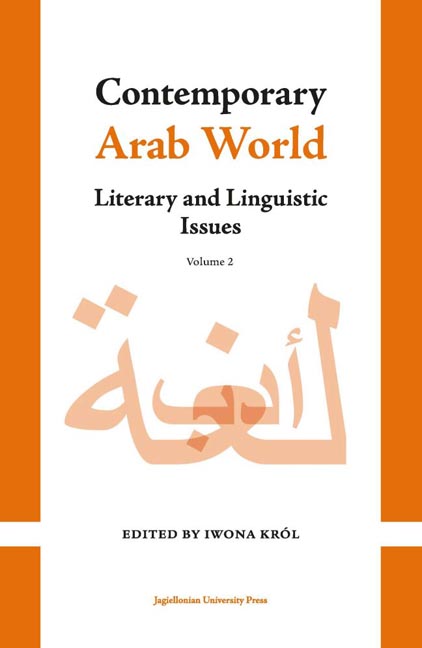Book contents
- Frontmatter
- Contents
- Introduction
- Karīm Maʿtūq and Other Winners of Amīr ash-shuʿarāʾ (Prince of Poets) First Contest
- Muḥammad Ibn Dāniyāl al-Mawṣilī – Arabic Aristophanes of Shadow Theatre
- Connotations of Home in Contemporary Palestinian Poetry – ʿAbd Allāh ʿĪsā’s Texts as an Example
- The “Mad Arab” Abdul Alhazred – Orient and Orientalism in the Works of Howard Phillips Lovecraft
- Functions of the Suffix -at in Nouns in Modern Standard Arabic
- Some Remarks on the Nature of Moroccan Regionalisms Based on the Analysis of University Admission Announcements
- Polish Deverbal Verbs and Their Hebrew Equivalents – A Contrastive Analysis Outline
- Annex: Abstracts – Streszczenia
- Miscellaneous Endmatter
- Frontmatter
- Contents
- Introduction
- Karīm Maʿtūq and Other Winners of Amīr ash-shuʿarāʾ (Prince of Poets) First Contest
- Muḥammad Ibn Dāniyāl al-Mawṣilī – Arabic Aristophanes of Shadow Theatre
- Connotations of Home in Contemporary Palestinian Poetry – ʿAbd Allāh ʿĪsā’s Texts as an Example
- The “Mad Arab” Abdul Alhazred – Orient and Orientalism in the Works of Howard Phillips Lovecraft
- Functions of the Suffix -at in Nouns in Modern Standard Arabic
- Some Remarks on the Nature of Moroccan Regionalisms Based on the Analysis of University Admission Announcements
- Polish Deverbal Verbs and Their Hebrew Equivalents – A Contrastive Analysis Outline
- Annex: Abstracts – Streszczenia
- Miscellaneous Endmatter
Summary
The publication at hand is the second volume of the monograph series entitled Contemporary Arab World. Literary and Linguistic Issues. As in the previous volume, the authors of individual papers are academics from the Department of Arabic Studies of the Jagiellonian University in Kraków. We present seven papers, which are the results of research conducted in the field of Arabic and Semitic linguistic and literary studies, and are devoted to subject matters important for the contemporary Arab world.
In the chapter entitled “Karīm Maʿtūq and Other Winners of Amīr ashshu ʿarāʾ (Prince of Poets) First Contest,” Barbara Michalak-Pikulska presents profiles of five poets coming from different Arabic countries, winners of the TV show Amīr ash-shuʿarāʾ, which is an example of combining the Western form of talent show with the Eastern literary tradition – promoting poetry and, at the same time, recalling the common cultural heritage in the era of globalization of the Arab world.
In the chapter entitled “Muḥammad Ibn Dāniyāl al-Mawṣilī – Arabic Aristophanes of Shadow Theatre,” Sebastian Gadomski reminds us of one of the few Arab authors of the shadow theatre plays, whose literary works have survived to our days. Ibn Dāniyāl al-Mawṣilī (1248–1310), due to the subject and language of his dramas, is sometimes compared to Aristophanes. Sebastian Gadomski first of all examines Ibn Dāniyāl’s theatrical output and presents it in the context of the socio-political situation of Egypt during the reign of Aẓ-Ẓāhir Rukn ad-Dīn Baybars in the second half of the thirteenth century.
“Connotations of Home in Contemporary Palestinian Poetry – ʿAbd Allāh ʿĪsā’s Texts as an Example” by Yousef Sh’hadeh focuses on examining the connotations of the word “home” and its synonyms often used in the poetry of ʿAbd Allāh ʿĪsā. “Home” has special implications in modern Palestinian poetry, expressing the peculiar situation of the Palestinian people scattered in the cities and villages of the Occupied Territories, and in the diaspora camps. “Home” appears in different linguistic and rhetorical contexts, creating meditative meanings, including multiple perceptions of it in different forms, such as: family home, homeland, sacred places, and the like.
- Type
- Chapter
- Information
- Contemporary Arab WorldLiterary and Linguistic Issues, pp. 9 - 10Publisher: Jagiellonian University PressPrint publication year: 2022



